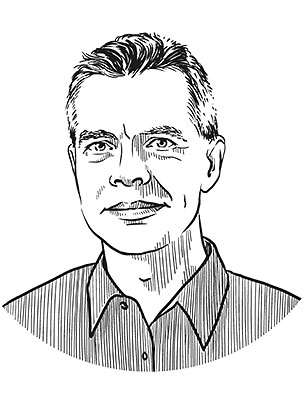Who owns our data?, Christian Tschudin?
Text: Christian Tschudin
We disclose data about ourselves on the internet all the time, without realizing it. A computer scientist and a lawyer show that research into safeguarding privacy can go hand in hand with asserting a right to privacy.
We kill people based on meta-data”, said the former CIA director Michael Hayden. In doing so, he provided a graphic illustration of how explosive so-called marginal data, also known as metadata, can be. These are data relating to, for example, the addresses of the sender and recipient of an e-mail, the place and time where and when it was sent, or its length. Across the world, internet providers are obliged to collect and store such metadata for several months. Even if the content of an e-mail is perfectly encrypted, it is accompanied by metadata that can themselves be highly informative.
From a technological standpoint, it is extremely difficult to conceal metadata, as sending an e-mail inevitably leaves behind traces in many places. Even an encrypted file system transports information. Unlike with encryption, there is, as yet, no universally applicable method of establishing complete privacy within the digital space. What is more, it is not even clear that this is desirable. Citing terrorism or organized crime, law enforcement authorities insist that they should be able to hack into smartphones. Can and should science seek out methods of establishing complete privacy, in the knowledge that these may be abused, making it more difficult to tackle crime? Absolutely!
Computer science is growing better all the time at extracting information in all spheres of life, from consumer behavior to genome analysis, leaving people exposed in the digital space. As science is partly responsible for the erosion of privacy in this brave new world, it has an obligation to create new spaces to which we can retreat as individuals and groups. If it does not, there is a danger that we will face totalitarian conditions of the sort described in literature, from George Orwell’s Nineteen Eighty-Four to Dave Eggers’s The Circle. A common feature of these novels is that “speech” is controlled and private spaces are deliberately eradicated.
I believe that research will succeed in establishing a truly private sphere within the digital realm. At the moment, we are still dealing with a world geared toward algorithmic efficiency, in which information is represented and transported using the minimum number of bits. It is already becoming clear that privacy solutions will involve a great deal of inefficiency, at least as measured by current standards. Since digital privacy has a price – in terms of disk space, computation time and energy consumption – the question of who can afford it will arise. I am confident. As has happened with encryption technology, the view that complete digital privacy constitutes a right will prevail.
Legal arguments about digital privacy – whether they be about the collection and storage of metadata, or the fact that it is a criminal offense not to disclose passwords, as in the UK, or the current proposals in the USA to require people to hand over DNA samples in order to claim health insurance – have been going on for a long time. Whether we will ever be able to enjoy a right to digital privacy does not depend on science alone, but it is up to science to make that even possible.
More articles in the current issue of UNI NOVA.

